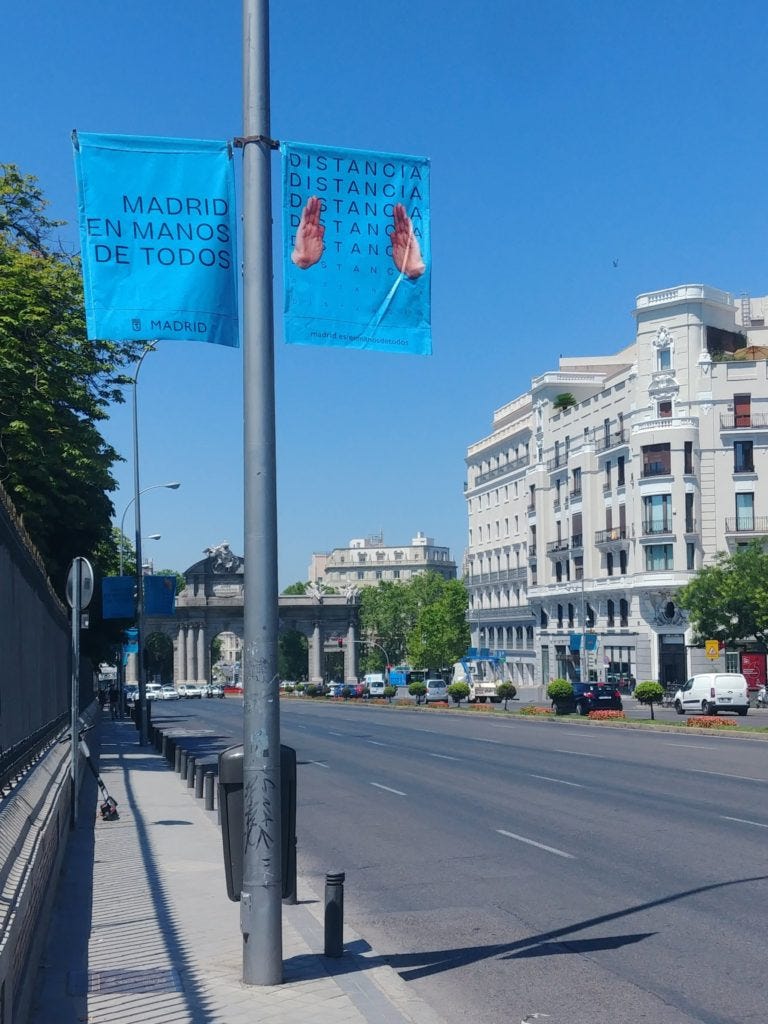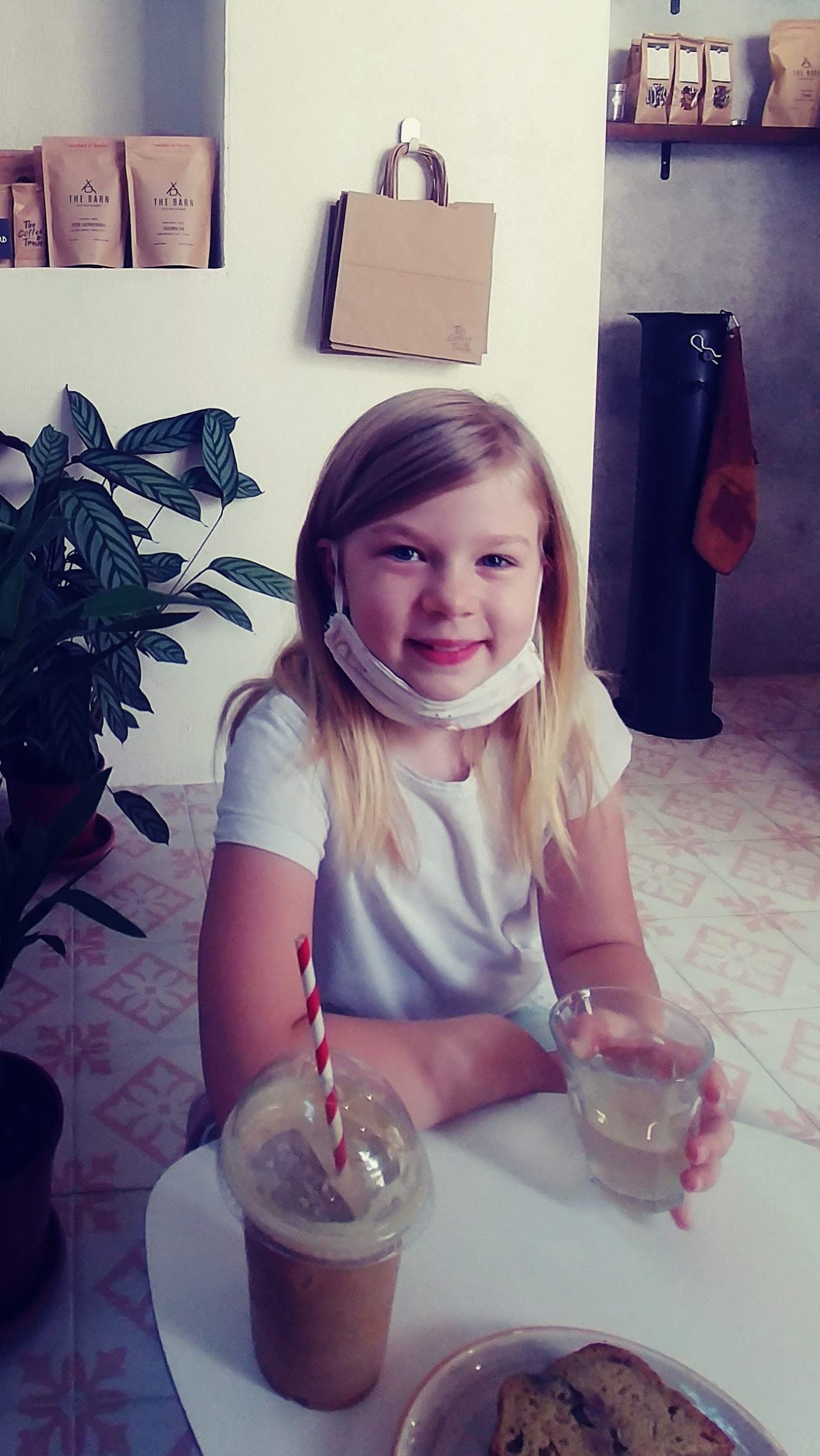Nothing Normal About This - the challenge edition
The estado de alarma (state of alarm) has ended after over 100 days, including 45 days without leaving our apartment (except for Chris, who bought groceries), but the government is calling our new way of existing "la nueva normalidad." I am obeying all laws, but I am also refusing to adapt this language.

In Spain, there is nothing normal about social distancing. Culturally the Spanish are an effusive people. They say hello and goodbye upon entering and exiting stores and passing people on the street. It is customary to give two kisses to every person in the room as you enter, to greet each one by name, to stand and chat for 15 minutes when you see a friend on the sidewalk or in line at the bank. We're used to lingering over the table, talking quietly long after the food is finished, not donning a mask and making room for the next people waiting in the sun. An outdoor restaurant at 50% capacity is not normal. Keeping the pool closed when it's 100 degrees outside is not normal. In downtown Madrid, Starbucks and many hotels are still totally closed. The security tape on our local parks came off just in time for the slides to be the temperature of lava. They're still essentially empty, but thankfully the kids can play in the sand now.
Some days I am very tired, and I realized recently that the name of what I am feeling is grief. In addition to the loss of our ministry, our week with my grandma, and our family vacation, I am grieving the loss of Spanish culture as I know it.
We go to church for an hour long service on Sundays, at about half capacity, and even fewer on Wednesdays. We canceled English camp, Vacation Bible School, English classes, and the coffee and discussion hour at church. I have been leading the ladies' Bible study on Tuesday evenings, since my coworker left for furlough, and it does feel sort of normal, except for the smaller group, masks, and no snacks. We can't share Bibles. People are not ready to hang out in homes yet, so we haven't been able to invite anyone for coffee or a meal, but we have shared meals outside with a few families.
The messaging on masks has been slightly different in Europe than in the states. Masks have always been seen as beneficial for the wearer and the people around the wearer. Doctors and the government have almost always said that Coronavirus spreads easily before an infected person knows they are infected, and that many infected people may never have symptoms. So, it wasn't a surprise that some kind of barrier would be required for all people. Masks were not required everywhere until the end of the state of alarm in part because they weren't readily available. I think PPE for medical professionals was prioritized, so pharmacies ran out of masks quickly at first. But, as soon as it was possible for anyone to have a mask, they became required inside any public space and anywhere outside where social distancing (2 meters) can't be guaranteed. What this looks like in Madrid is 100% of people wear masks inside stores. Occasionally I will see someone letting their nose breath, but most people are very careful. The kids' masks sometimes fall down and they've been gently asked to put it back in the store. Once you sit down at your table in a restaurant you are allowed to remove your mask, but expected to wear it when moving about the restaurant. All the tables are equipped with QR codes where the menu can be found.
Some employees (and one of my dear friends who is very nervous) wear masks and face shields. Outdoors, it's common to see people go without, but not in crowded places. People doing exercise are less likely to wear masks, of course.
Since people can go to work now, there are summer day camps at the schools and community centers. Our friend S, a program director at an elementary school, says it feels like military camp. He looks very tired at the end of the day. For now, it seems like everyone is wearing masks. When school starts in the fall though, many people think students will be permitted without masks, especially the youngest (Spanish kids start school if they turn 3 before January).
Today we went on a hike. Doing my research beforehand, I discovered some amazing sites with natural pools, but there was a warning that bathing in creeks, lakes and rivers is not allowed in summer 2020. People were wading in the creek along our hike, though.
There are very few tourists, so Spain is not as crowded as usual, but I noticed the difference immediately when we were allowed out again. People were desperate to have tapas with friends, get their kids out of the house, go shopping, and exercise, and they have poured into the streets as usual.
As Americans living in Europe, it's been hard to watch what's happening in the US. It's not an election year here, but there was opposition to the president's Estado de Alarma (which granted him extra power) at every turn. The last extension in June was opposed by 3 leaders from major parties. We see people using the word "lockdown" but we know that can't possibly be used to describe the freedoms enjoyed even during "shelter-in-place" laws. If you have always been able to take a walk in your neighborhood, visit the forest with your children, or, as I've noticed lately, just choose a park in a different city, then you're not in a lockdown, not sheltering-in-place...not really doing anything to combat the spread of the virus. There are still outbreaks happening in Spain, but they seem more contained than during those horrible days of nearly 1000 people dead. Now, local governments enforce short term quarantines, don't let people in or out of the city after 4 pm, and two weeks later things seem better. This is happening more in Catalonia.
Well, I'm sorry if this was a post on the boring side. Many people have been curious about how Coronavirus has affected us, so I thought I'd write a post about this supposed "new normal" that is freakishly abnormal. Our life is slow and somewhat boring. The kids are tired of us. All our plans are canceled, and our pool is closed, and we can't go to the mall every day. Some days, especially the extra hot ones, it feels like we're still in quarantine.
Another challenge we've faced has to do with language learning. This term, Spanish is our main priority. Not only did we spend almost three months with no interaction except through a screen (I can't emphasize how much that did not work for me), now we are trying to learn Spanish without being able to see the lips of the people we're talking to. Masks and plastic shields make it IMPOSSIBLE to understand people. The other day at a new Lidl, a soft-spoken man was asking shoppers on the way out for our street (calle, pronounced cah-yeh) and if there was a community basket for flyers. If I so much as leaned closer to understand him better, he took two steps back. My coworker was certain he was asking for her talla (pronounced tah-yah) and could not figure out why he would need to know her shirt size! We've only been here two years; having to learn and practice Spanish with masks just adds insult to injury. And this new culture's constant emphasis on fear of man, when we are desperate to create connections and build bridges for the Gospel is so discouraging.
This has been a Coronavirus update: challenge edition. Stay tuned for the blessing edition, coming next!





